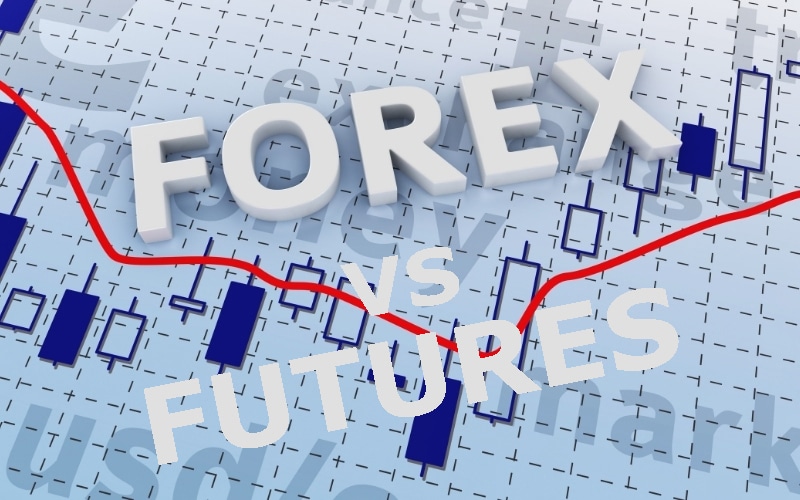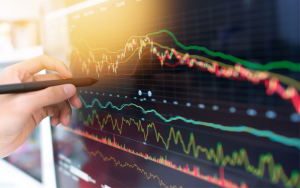The forex or currency market is a widely traded asset with a daily volume nearing 6.6 trillion $. It is an over-the-counter industry that allows you to trade currencies 24/5. High liquidity and volatility of FX is due to its global reach. Traders can buy or sell one currency against another that is traded in pairs such as EUR/USD, GBP/JPY, and so on.
Unlike forex, futures markets operate on contracts that have a specific expiration date. There are many futures, including commodities, stock index, currency, precious metals, and US treasury. These assets are open to trade from 9:30 a.m. to 4 p.m. Eastern time, Monday to Friday.
Some traders may confuse options and futures contracts. The difference between them lies in the fact that options allow you the right to buy/sell them at expiration time while a futures holder has an obligation to buy/sell the same.
Reasons to trade futures over forex
We can underline the following reasons to trade the futures market over currencies.
Lower costs
The transaction costs that come via trading futures are considerably low compared with FX. Let us take an example of currency futures for our understanding. The average spread on EUR/USD is one pip with most forex brokers where trading a standard lot will cost you 10 or 20 dollars upfront. Same execution on 6E, a contract for the identical currency pair will cost an average of $5 plus the spread.
Price Manipulation
Futures have a much more fair environment where there are no price manipulations as one central exchange connects all the instruments. Such an approach ensures that your futures broker doesn’t go stop loss hunting, something prevalent in currency trading. There might be a difference in the feed at forex due to the middle man’s involvement or dealing desk, which is evident by comparing different brokers.
Assets
Futures trading offers a wide range of assets and is not limited to just forex pairs. The instruments include commodities, liquid indices, bonds, and major currencies, as stated before. An average forex broker only provides around 50 pairs to trade, out of which ten are useful as others have low liquidity or high spread. This is not the case with futures where the options are vast, and conditions are similar, diversifying a trader’s portfolio.
Volume
Volume is one of the major concerns for traders who center their strategy around it. With forex, there is no centralized exchange resulting in the unavailability of volume to traders. Accessing data from one FX broker is not sufficient as it does not take others into account. The centralization of futures markets ensures that volume data is available to all traders.
Regulation
The futures market is generally more regulated in contrast with forex. In currencies, unless you are trading through a brokerage that resides in the US or offers its services to US residents, it is likely not under a soundcheck and balance. Commodity Futures Trading Commission (CFTC) regulated futures brokers in the United States which are available globally to market participants.
Similar treatment for professionals and retailers
Futures offer the same level of treatment for both professionals and retail traders. There are no differences in order execution policy.
Reasons to trade forex over futures
After reading the reasons to consider futures over forex, you may be drooling over the contract market. However, trading currencies do have a certain edge, as discussed below.
Overall volume
Other markets look like a tiny spot in front of trading volume in forex capped at $6.6 trillion at 24 hr. Futures have a puny $50 billion $ traded per day. The high volume traded in currencies makes it one of the most liquid assets where buy/sell executions can be carried out as needed.
Time
Unlike futures, which have limited trading hours, forex is a 24-hour market that runs from Monday to Friday. As a trader, you don’t have to set up your alarm according to the exchange times. Instead, you can set your schedule as per desire. Futures do have overnight markets, but the current scope is limited, and the liquidity is extremely low.
Margin requirements
The margin requirements for forex is low in contrast with futures. In the FX market, the set value can be as low as 0.25% to keep your positions open.
Range of brokers
The current range of brokers providing services to traders in forex is a lot higher than futures. You can read thousands of available brokerage reviews online and choose the best one quickly. Similarly, the number of robots and indicators is considerably higher.
Activity
Forex is active throughout the day when traders participate in their favorite pairs at the related sessions. On the other hand, Futures is mostly alive after the first hour of opening the markets, after which the market becomes super quiet.
Minimum deposit
One of the active benefits of forex is the available minimum to test out the markets. Many brokers require as low as $5 in a deposit. You can also opt for micro accounts that offer even low risk-on trading.
Summary
Both forex and futures have various unique qualities that may suit their personality and trading style. While currencies are the first choice of many beginners due to their low risk, capital requirement, limited exposure to long-term risk futures are preferred by those who want to sit toe to toe with the big boys.



